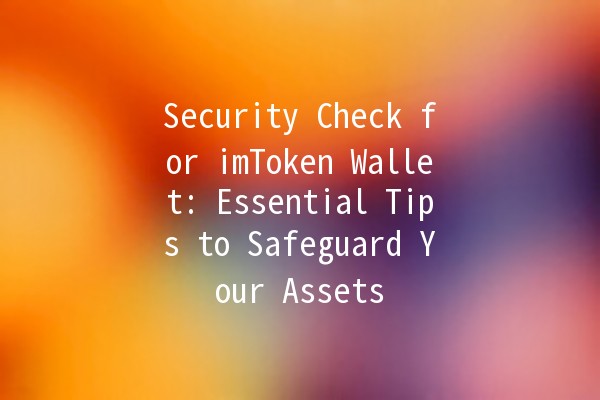In the everevolving landscape of cryptocurrency, security is paramount. As digital assets gain popularity, the risk of cyber threats increases. Among the various wallets available, imToken stands out as a choice for many users due to its userfriendly interface and robust features. However, like any financial tool, it requires diligent security checks to ensure the safety of your assets. Here, we provide practical advice and actionable tips to help you maintain the security of your imToken wallet.
Before diving into security tips, it's important to recognize the potential risks associated with using a digital wallet:

To mitigate these risks, consider the following essential security practices:
Twofactor authentication adds an extra layer of security to your account by requiring a second form of verification, such as a code sent to your mobile device.
How to Apply:
Go to the imToken app.
Navigate to your settings and find the security options.
Enable 2FA and link your mobile number or authentication app.
Example: By enabling 2FA, even if someone obtains your password, they would still need access to your mobile device to log into your wallet.
Your password is your first line of defense against unauthorized access.
How to Apply:
Create a strong password that includes a combination of uppercase and lowercase letters, numbers, and special characters.
Avoid using easily guessable information, such as birthdays or names.
Example: Instead of using "Password123!", opt for a password like "G7#pQr4z!9kLm$8v" to greatly enhance your security.
Regular updates ensure that your wallet and device have the latest security patches and features.
How to Apply:
Enable automatic updates for the imToken app and your device's operating system.
Regularly check for updates in the app store.
Example: An update may include fixes for vulnerabilities that could exploit your wallet, reducing the risk of attacks.
Backing up your wallet allows you to restore access to your assets should your device become lost, stolen, or compromised.
How to Apply:
Use the backup options in the imToken app to export your private keys or mnemonic phrases.
Store these backups in a secure location, such as a password manager or secure offline storage.
Example: In the event of losing access to your device, your backup will enable you to regain control over your funds promptly.
Public WiFi networks can expose your data to cyber threats, making it vital to avoid accessing sensitive information when connected to them.
How to Apply:
Use a Virtual Private Network (VPN) when accessing your wallet on public WiFi.
Log in to your wallet only over secure, private connections.
Example: A VPN encrypts your data and can prevent unauthorized access while you're connected to a potentially compromised network.
Maintaining the security of your imToken wallet is a proactive process that requires vigilance and awareness. By implementing these strategies, you can significantly reduce the risks associated with digital wallets and ensure that your assets remain safe. Ensure you stay informed about new security features and best practices as the digital landscape continues to change.
If you believe your wallet is compromised, immediately change your password, and enable 2FA if you haven't yet. Transfer your assets to a new wallet with a strong password and backup.
Look for suspicious indicators such as misspelled URLs, poor grammar, or requests for sensitive information. Always verify links before clicking.
Storing private keys on your device can be risky, especially if your device is connected to the internet. Consider using a hardware wallet for enhanced security.
If you have backed up your mnemonic phrase, you can recover your wallet even if you forget your password. Ensure you store your backups securely.
Using a reputable password manager can enhance security by generating strong passwords and securely storing them, making it easier to manage multiple accounts.
Unusual activity such as unauthorized access to accounts, slow performance, or unexpected popups may indicate malware. Run a security scan to detect and remove malware.
Implementing these practical tips will go a long way in safeguarding your digital assets. Remember, security is a continuous process that requires regular attention and updates. Stay informed, stay secure, and keep your assets safe!